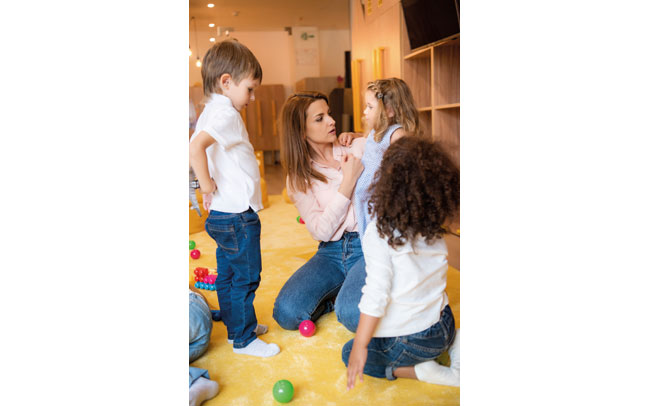Whether you are a stay at home parent or working full time, when your toddler reaches around 2 years old, which happens just too fast, your hunt for a nursery begins. Whether it is for day care while you are at work or you want your child to mix with others and start learning new things, looking for a nursery becomes a a key occupier of your time. And, as you will be sending your little one out for the very first time, you want to make sure you find the best nursery that suits your needs. But, with so many options around and, not to forget different opinions coming from almost everyone you meet, choosing a nursery becomes a very challenging task.
If you are experiencing this now or soon will be, we have done some basic homework for you. We have identified the important things you should either observe or ask a nursery, before you decide and say 'this nursey will be my baby’s first school'.
Ask yourself some important questions before you begin to look for a nursery
Before you start to shortlist nurseries, it is important that you set your priorities right and eliminate a whole chunk which do not fit in the criteria. Ask yourself questions regarding transportation, timings, summer break timings and affiliation with primary schools, once you sort all these things out, half the work is already done and, then comes the time to visit the shortlisted nurseries.
Karen Green, Principal, The Children’s Garden - Green Community said, “Before you start looking, have an idea of what it is you want your nursery to provide. Are you looking for childcare provision to cover the hours while you are at work? Is the provision of transport important for you? What is the style and content of the curriculum that you are looking for? Related to this, ask about the highest level of qualification that all staff are expected to hold. Is transfer to a local primary school an important factor for you? Asking these questions first means that you can gather basic information before you even visit the school, and not waste time visiting places that do not meet your requirements.”
Trained staff
Your child is going to be managed by the staff. Hence, it is very important for a nursery to have well qualified staff. Don’t be shy to ask if the appointed staff are professionally certified and can manage a toddler with care.

Observe staff and child interaction
When you visit the nursery we recommend that you keep your eye on staff and child interaction. It plays an important role, if the staff are not interested in their job, and you would not want to choose that nursery. In today’s digital world, observe posts on a nursery’s social media pages as well.
Karen Green of The Children’s Garden - Green Community said, “When you visit a prospective school, observe how the staff interacts with the children and with each other. Do you see staff that are happy, engaged and respectful? Is the atmosphere purposeful yet joyful? Are the children engaged with the activities provided and showing interest in their learning? Are any children who may be upset attended to swiftly and with care? Relating to the point above, are you comfortable with the idea of your child being in this environment, with this group of people?”
Samina Khanyari, General Manager, Jumeirah International Nurseries said, “Talk to the staff during the tour, ask them questions like positive and negative experience of working at the nursery, as well as, the opportunity of continuous professional development provided.”
Learning environment
You need to observe the child play area to understand if the activities revolve around learning new things or if it is all about playing with toys.
Samina Khanyari at Jumeirah International Nurseries said, “Spend a few minutes observing children’s play to see if they are purposefully engaged. Look for evidence of fun, quality learning experiences. Look for staff creativity in organising the play spaces and use of resources, as this would fuel your understanding of how every child’s needs are catered. If the resources around the nursery are just off-the-shelf toys, children will soon be bored and outgrow them and their potential will remain unexplored.”
Health and Safety
Pay important attention to the health and safety parameters at the nursery. Check if the nursery easily allows strangers to get in or if they have proper security checks in place, if they have all the security equipment installed like security cameras, fire alarms, and if the building is well built and maintained properly over the years. Do pay attention to the overall hygiene factor, specially if the child's food is provided by the nursery.
"For parents, it should be of paramount consideration that the nursery their child goes to is safe in terms of how well the pre-school is built and designed”, said Dr Vandana Gandhi, Founder and CEO of British Orchard Nursery.
Good and effective communication between the nursery and the parents`
The best outcome for children is achieved when parents and educators work in co-ordination and harmony. You must check how proactive the nursery is in getting back to your queries, doubts or suggestions.
Samina Khanyari at Jumeirah International Nurseries said “Email simple questions along with complicated ones, to see the response time and tone of the communication. You will know if you are listened to and understood. Look for signs of how the nursery empowers parents and engages them directly in their child’s learning experience. “

Getting ready for the ‘big’ school
A good nursery not only teaches children to socialise with their peers but also creates the platform for further education. When choosing pre-schools parents should be mindful of this in particular, and opt for institutions where their child can be individually assessed. This baseline will help to develop their learning graph accordingly.
Dr Vandana Gandhi, of British Orchard Nursery said, "At British Orchard Nurseries, we do this through our award-winning baseline book which we have created. This book sets out the guidelines of developmental learning intentions for each child from birth all the way up to ‘big school’, so that we know exactly what each individual child’s needs are and where they stand developmentally."
Trust your instinct
" A final thought: A school may meet your requirements and be able to answer all your questions. However, what you feel when you walk through the door is worth a thousand words. Trust your instinct", suggested Karen Green of The Children’s Garden - Green Community.
A little homework can save you from a lot of stress in the future and can ensure you choose what is best for you and your child.